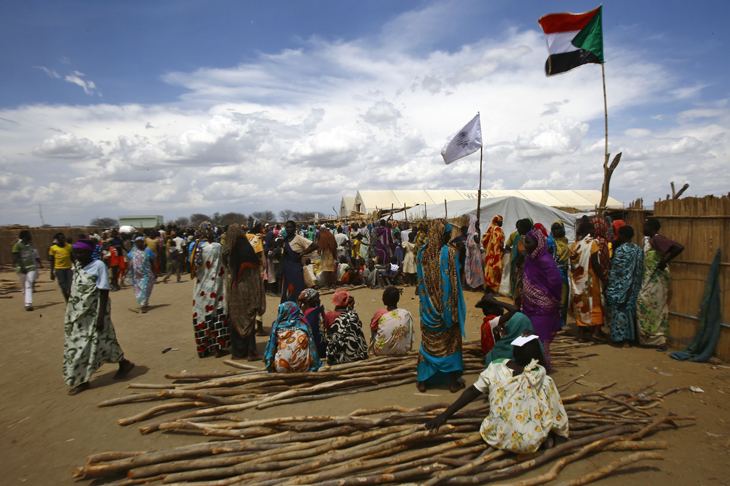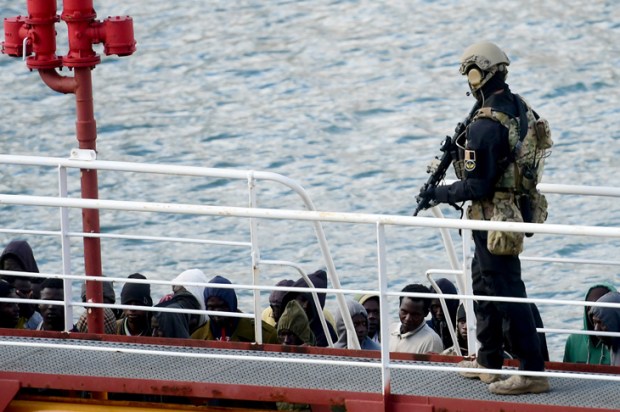The Conversation is an online journal publishing commentary from Australian academics about current issues. It claims to present articles with ‘academic rigour and journalistic flair’. Naturally, as it is written by the people who populate Australia’s universities, whenever it is discussing social issues, it almost invariably does so from a left-wing perspective. Nevertheless, sometimes its articles are characterised by academic rigour and journalistic flair. And other times they are not.
Sometimes the articles are so full of rubbish that one must wonder what is going on in our universities.
A recent article by Gerhard Hoffstaedter, a senior lecturer at the University of Queensland and visiting academic Sara Riva modestly titled ‘There are 70 million refugees in the world. Here are 5 solutions to the problem’, is a case in point,
The solutions presented by this doughty pair of Phds are as follows;
– Give refugees their rights: enforce international conventions
– Share the responsibility: regional refugee compacts
– Treat refugees like human beings: close detention centres
– Allow them to participate: work rights for refugees
– Let them in: open borders.
Even the ‘Let’s Close Manus Island’ show on the ABC, aka The Drum, doesn’t go quite so far as to advocate open borders in its almost-daily discussions of how inhumane Australians are. So does it matter that a senior lecturer at an Australian University is prepared to put his name to a solution to the global refugee problem which is, at best, an unworkable, unrealistic fantasy? Consider the following indisputable facts.
MENA is the unattractive acronym for The Middle East and North Africa. These two regions are increasingly being lumped together because they are both experiencing exceptionally high population growth. The population of MENA in 1950 was 100 million. In 2000 it had increased to 380 million. The phenomenal growth is due partly to the arrival of Western medicine which has lowered the infant mortality rates and controlled diseases which previously killed millions, and partly to improved agricultural techniques and overseas assistance which have reduced the impact of famines.
The truly difficult fact to accept is that every time the various charities and United Nations programs operating in many of these areas save a life, they are also, by definition, compounding the problems caused by unrestrained population growth. Unlike most branches of the social sciences, demography is able to make precise, reliable predictions about the future. The population of the region is increasing at 2 per cent per year and approximately 7 million people are added every twelve months. A decade from today there will be another 70 million people needing food and shelter in a region which is incapable of producing enough food for the present population.
If Australia took one million people a year from MENA for the next decade we would be enriched with ten million more Muslims but there would still be another 60 million more people in that unfortunate region many of whom will require international assistance.
Hoffstaedter and Riva’s ‘open the borders’ solution is akin the ‘let them eat brioche’ comment attributed to Marie Antoinette. Our two refugee advocates, like Ms Antoinette, both show a complete inability or unwillingness to grapple with the root cause of the problem they are addressing. In this, of course, they are not alone. The left-wing media outlets such as the ABC and the Fairfax press, on a daily basis, publish more articles about the tragedy of one thousand people held in Australian offshore detention facilities than they do about the other 69,999,000 people languishing in camps around the world.
In two centuries from now, assuming we haven’t wiped ourselves out, historians will look back on this era and ask of us exactly the same questions the we ask of the aristocracy in late 18th century France: how did we not understand the problem? Why didn’t we do more?
Just as the French aristocracy were unable to agree on a course of action which might have avoided the tragedy of the French Revolution, so the affluent nations of the world argue and bicker among themselves while a demographic time bomb continues to develop.
The current number of displaced persons globally is still increasing exponentially and, unless the world acts in concert, the number under the care of the UNHCR will soon reach 100 million. This is the only story about refugees which matters but what we see, in the attitude of academics like Hoffstaetder and the journalists pontificating on the ABC and SBS, is a complete refusal to face reality.
The problems presented by the MENA region of course apply to other regions. Sub-Saharan Africa shows a similar pattern of population growth aided and abetted by Western relief work and a similar inability to introduce political changes which would improve the lives of the people born there. The problems which we see on the borders of Europe and the US are only going to increase unless the root causes of the problems in developing countries are addressed.
The real tragedy is that a solution is possible. In 1949 when the communists finally got control of the Chinese mainland, the population they had to manage was 540 million. In 1979, thanks to Mao’s disastrous population growth policy, it had increased to 969 million most of whom were still living in poverty. Today, the population is 1.4 billion and the number rescued from a life of hardship and poverty is around 700 million.
I am not arguing that we should put Xi Jingping in charge of solving the world’s refugee catastrophe. But this is a global problem and the only hope of finding a solution is via genuine global cooperation. The focus on Donald Trump’s wall or Peter Dutton’s detention centres does nothing to educate the populace about the real nature of the problem.
Unless the Arab world and Africa can achieve political stability free from corruption and establish massive economic growth, then the refugee numbers we are currently witnessing are a mere trickle compared with what will follow. To establish the circumstances under which political stability and economic development can emerge in the MENA block, will require the cooperation of the West, China and Russia. This is not going to happen. The academics and journalists who choose to ignore the evidence of this impending catastrophe should hang their heads in shame.
Got something to add? Join the discussion and comment below.
Get 10 issues for just $10
Subscribe to The Spectator Australia today for the next 10 magazine issues, plus full online access, for just $10.
You might disagree with half of it, but you’ll enjoy reading all of it. Try your first month for free, then just $2 a week for the remainder of your first year.














Comments
Don't miss out
Join the conversation with other Spectator Australia readers. Subscribe to leave a comment.
SUBSCRIBEAlready a subscriber? Log in